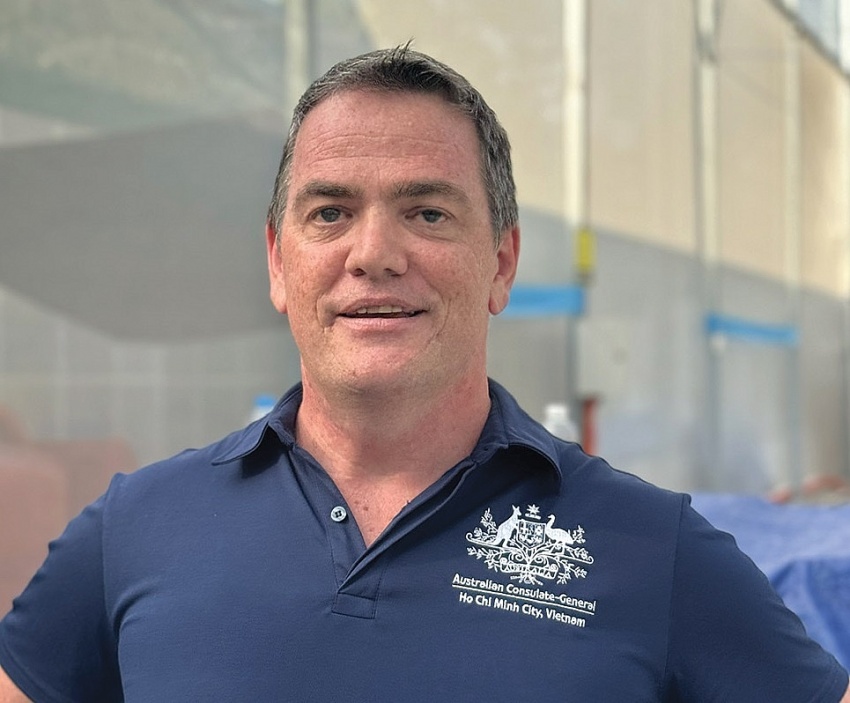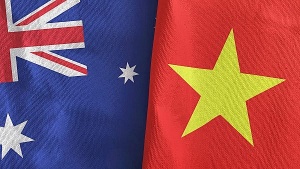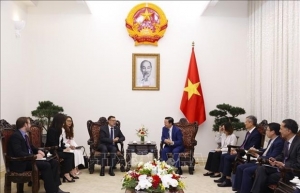Australia prioritises support in Mekong Delta region
How do you facilitate communication between the Vietnamese and Australian governments, especially regarding development projects in the Mekong Delta?
 |
| Ciaran Chestnutt, deputy consul-general of the Australian Consulate-General in Ho Chi Minh City |
These projects stem from a longstanding relationship between Australia and Vietnam spanning over 50 years. We’ve collaborated on various developments, making it a well-established bond. When it comes to the practical implementation of projects, we closely engage with the Vietnamese government.
Since 2000, Australia has delivered more than AU$650 million ($424 million) in official development assistance (ODA) to the Mekong Delta. The region faces significant challenges, including low economic growth, a lack of capital investment and physical infrastructure, vulnerability to the effects of climate change, a decrease in volume and quality of water resources and an ageing population affected by labour migration.
In 2020, Australia announced the first phrase AU$232 million ($151 million) Mekong Australia Partnership. Under its environmental resilience pillar, projects have been delivered regionally in Southeast Asia using ODA, including in the Mekong Delta.
Separately, under the Australia-Vietnam Enhanced Economic Engagement Strategy, and part of the Mekong-Australia Partnership, non-ODA funding has been provided to grow bilateral trade and investment in southern Vietnam.
A comprehensive strategic partnership was signed recently, aligning well with the projects we’ve observed. This partnership emphasizes cooperation on climate change, energy, and the environment, which are key pillars of our activities. As we move forward with implementing the partnership, projects like these will be at the forefront.
During a visit in August 2023, the Australian foreign minister announced a package of support for climate change adaptation in the Mekong Delta of AU$94.5 million ($61.7 million) for 2023-2034.
The adaptation package will share Australian expertise and promote climate resilience and adaptation efforts by communities, small businesses, and women leaders in the Mekong Delta of AU$75 million ($49 million) for 2024-2034.
Australia will also support a project to transform rice cultivation in the Mekong Delta to produce low emission and sustainable rice, worth AU$17 million ($11 million), for 2023-2028.
We will launch a project to leverage private sector funds to support climate adaptation and resilience in the Mekong Delta, and are sharing our technical expertise to support adaptation in the water sector with the Australia Water Partnership, worth AU$2 million ($1.3 million) over 2023-2024.
How does the Vietnamese government receive your feedback, and how does collaboration ensure that farmers can receive the benefits?
Our approach in Australia is collaborative, and we prefer dialogue to dictation. We strive to understand what will work best for our partners and the local context. When developing projects, we engage with a wide range of stakeholders, from local to central government officials, as well as local farmers and experts.
This consultation process is crucial to us. We pride ourselves on not imposing solutions based solely on our Australian perspective, but rather learning from the Vietnamese viewpoint.
The commitment of Australia and Vietnam to enhance cooperation on climate change, energy, and the environment, as part of the comprehensive strategic partnership, will drive much of our future work. The Vietnamese government has prioritised the Mekong Delta for climate change adaptation, and we’re responding to that need. We’ve committed significant funds to climate change adaptation projects in the delta, and you can expect more announcements soon.
What is the expected role of Vietnamese scientists and experts in these projects?
Experts play a crucial role. Australia faces its own climate change challenges, which is why our collaboration with Vietnam is so vital. Through our own experiences, we’ve gained valuable insights. However, here in the Mekong Delta region, local experts like those at Can Tho University are indispensable. They possess intimate knowledge of the local conditions, understand the pertinent issues, and often have innovative solutions. We heavily rely on their expertise when implementing projects
The collaboration of local governments, farmers, and communities is essential for the success of the projects we’ve been visiting. We rely heavily on local expertise, knowledge, and passion for agriculture and climate adaptation. Without this local spirit, we wouldn’t be able to initiate these projects. Having strong partners is crucial, and we highly value the support of local governments.
I don’t possess the same level of understanding of the delta as the locals do, and so it’s crucial to have their insights. These projects are not only beneficial for the environment but also improve livelihoods and incomes for local farmers. By working closely with local communities and leveraging their knowledge, we ensure the success and sustainability of these initiatives.
 | Vietnam and Australia to enhance engagement under comprehensive strategic partnership Enhancing economic engagement is highlighted as Australia and Vietnam upgrade relations to a comprehensive strategic partnership. |
 | Vietnam, Australia cooperate to develop offshore wind power projects Deputy Prime Minister Tran Hong Ha received Australian Ambassador to Vietnam Andrew Goledzinowski and leaders of Corio Generation of Australia’s Macquarie Group in Hanoi on March 28. |
What the stars mean:
★ Poor ★ ★ Promising ★★★ Good ★★★★ Very good ★★★★★ Exceptional
Related Contents
Latest News
More News
- State corporations poised to drive 2026 growth (February 03, 2026 | 13:58)
- Why high-tech talent will define Vietnam’s growth (February 02, 2026 | 10:47)
- FMCG resilience amid varying storms (February 02, 2026 | 10:00)
- Customs reforms strengthen business confidence, support trade growth (February 01, 2026 | 08:20)
- Vietnam and US to launch sixth trade negotiation round (January 30, 2026 | 15:19)
- Digital publishing emerges as key growth driver in Vietnam (January 30, 2026 | 10:59)
- EVN signs key contract for Tri An hydropower expansion (January 30, 2026 | 10:57)
- Vietnam to lead trade growth in ASEAN (January 29, 2026 | 15:08)
- Carlsberg Vietnam delivers Lunar New Year support in central region (January 28, 2026 | 17:19)
- TikTok penalised $35,000 in Vietnam for consumer protection violations (January 28, 2026 | 17:15)

 Tag:
Tag:




















 Mobile Version
Mobile Version